
How to Choose the Right Bariatric Vitamins for Your Unique Needs
Bariatric surgery affects the body's ability to absorb essential nutrients, making it crucial for patients who have just undergone weight loss surgery to supplement their diet with bariatric vitamins. But with numerous bariatric vitamins available, how do you identify the right ones for your unique needs?
In this blog post, we'll explore the various types of bariatric vitamins, key ingredients to look for, common pitfalls to avoid, and more to help you make an informed decision when selecting bariatric vitamins.
Types of Bariatric Vitamins: A Quick Overview
When it comes to bariatric vitamins, there's no one-size-fits-all option. There are a variety of different vitamin formulations designed to meet specific dietary needs. Here's a quick rundown of the essential supplements recommended for most post-bariatric surgery patients:
Bariatric Multivitamins
Bariatric multivitamins provide a comprehensive range of vitamins and minerals in concentrations higher than over-the-counter multivitamins. They typically come in liquid or chewable form for easier absorption.
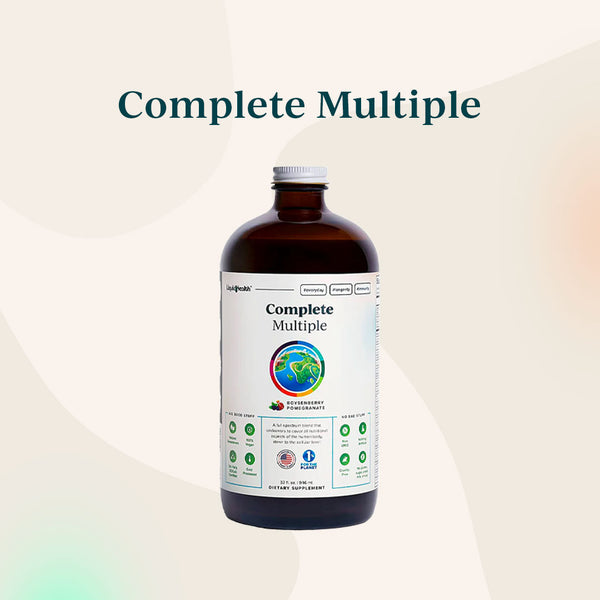
If you want to get an optimal dose of key nutrients without having to take multiple pills, bariatric multivitamins like our Complete Multiple Liquid formula are an excellent choice.
Stand-Alone Bariatric Supplements
Although multivitamins serve as the cornerstone of post-surgery supplementation, you may still need extra help with certain nutrients. Stand-alone bariatric supplements fill this gap effectively. Some common stand-alone options include:

- Iron supplements such as our Vegan Liquid Iron formula
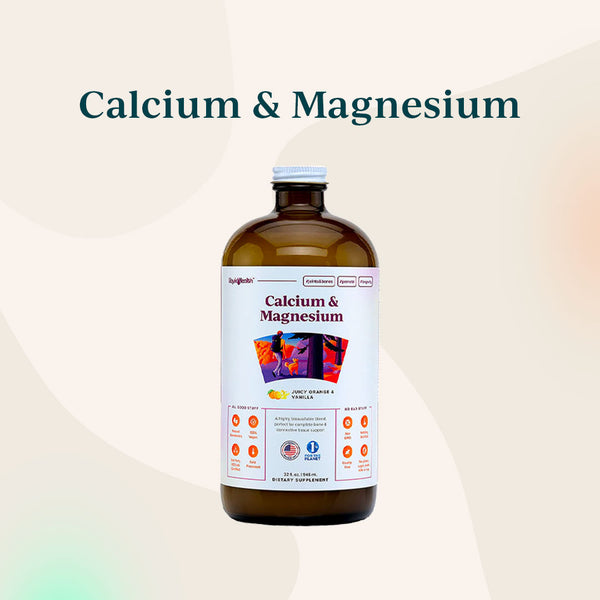
- Calcium with vitamin D supplements, such as our Calcium & Magnesium formula

- Vitamin B12 supplements such as our Methyl B12 drops
Like bariatric multivitamins, these stand-alone supplements often come in chewable or liquid form for better absorption.
Injectables
While many bariatric vitamins come in liquid, chewable, or pill form, some forms are administered via injections. Injectable forms bypass the digestive system, ensuring optimal absorption.
Key Ingredients to Look for in Bariatric Vitamins
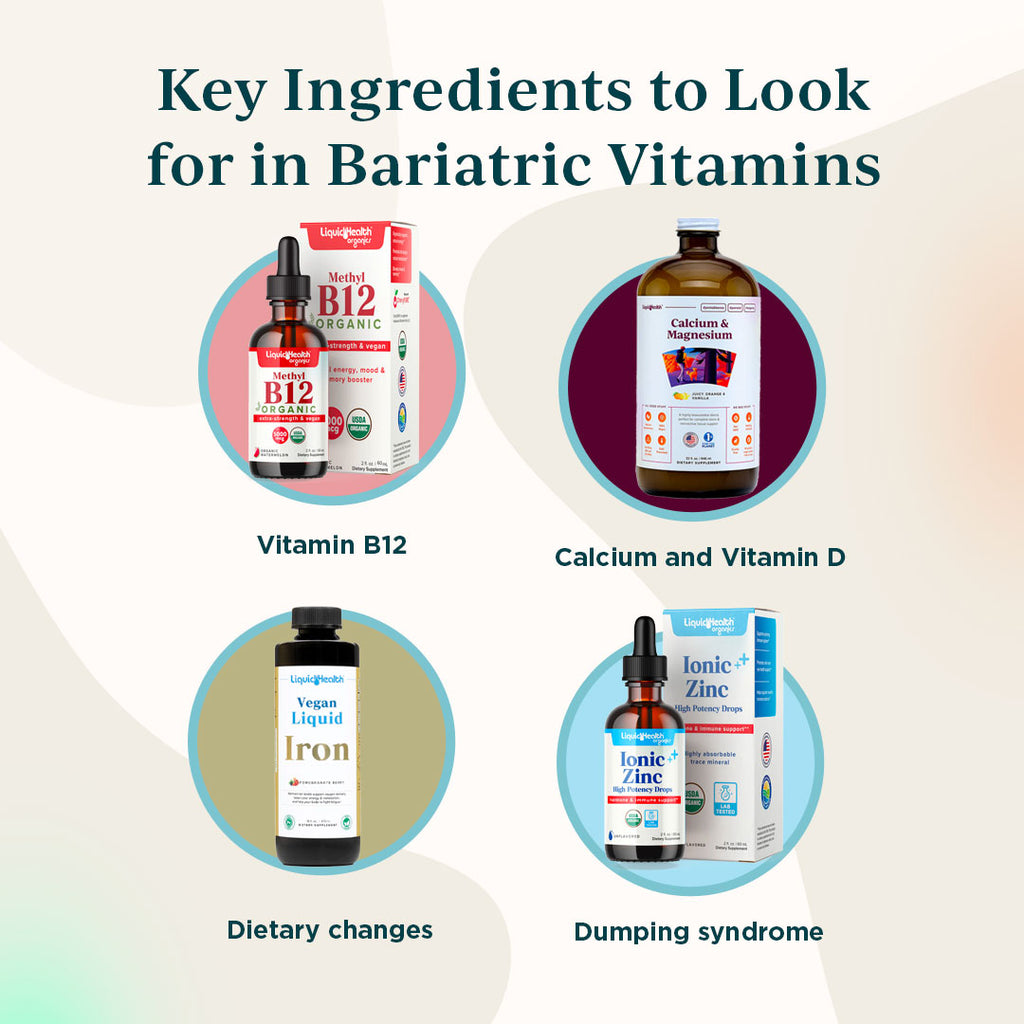
While the specific bariatric vitamins you might need post-bariatric surgery will vary based on your surgery type, dietary preference, and underlying medical conditions, there are several key nutrients you must take. Here are the essential nutrients to look for in bariatric vitamins:
Vitamin B12
Vitamin B12 is pivotal in the production of red blood cells, DNA synthesis, and proper nerve function, and its absorption can be significantly reduced after weight loss surgery. Look for bariatric vitamins with a high concentration of vitamin B12, preferably in sublingual, liquid, or injectable forms for easier absorption.
Calcium and Vitamin D
Calcium and vitamin D are essential for bone health. Unfortunately, after weight loss surgery, your body's ability to absorb these two critical nutrients diminishes. Look for bariatric vitamins with a combination of calcium and vitamin D to address nutritional deficiencies. Alternatively, opt for a separate vitamin D supplement as recommended by your doctor or dietician.
Iron
Iron plays an instrumental role in the creation of red blood cells and the prevention of anemia, a condition that's common among post-bariatric surgery patients who don't take iron supplements. Look for bariatric vitamins rich in iron based on your doctor's or dietician's advice. Also, as a general guideline, opt for supplements with iron in a form that's gentle on the stomach and easy to absorb, like ferrous fumarate.
Zinc
Zinc is a trace mineral that supports wound healing, immune function, and DNA synthesis. Post-surgery, the body's ability to absorb zinc reduces, making supplementation crucial.
Other Vital Vitamins and Minerals
Besides the vitamins and minerals already mentioned, some other vitamins and minerals include:
- Vitamins A, C, E, and K
- Folate
- Selenium
- Copper
- Thiamine (vitamin B1)
However, this isn't an exhaustive list of all the nutrients required, as your individual needs may vary. Consult your doctor or dietician for a customized vitamin regimen tailored to your unique post-bariatric surgery requirements.
Considerations for Different Bariatric Procedures
While all bariatric vitamins aim to address nutritional deficiencies, your body's ability to absorb certain nutrients will vary depending on the type of surgical procedure you underwent. Here's a brief overview:
Gastric Bypass Surgery (Roux-en-Y)

This procedure involves surgically dividing the stomach to create a small pouch, limiting the food one can eat. The procedure bypasses portions of the small intestine, leading to a higher risk of malabsorption.
Therefore, you may require higher doses of certain nutrients like iron, calcium, vitamin D, and vitamin B12 if you undergo gastric bypass surgery.
Sleeve Gastrectomy
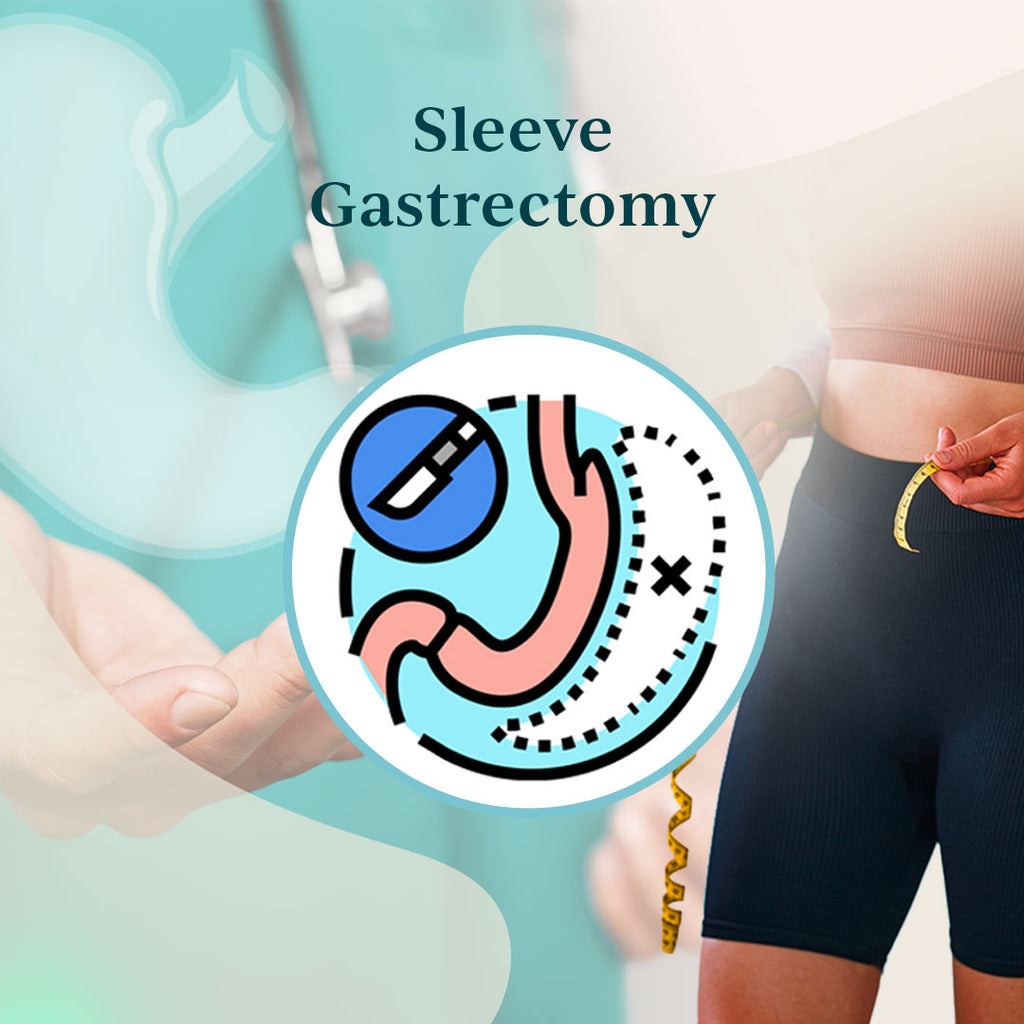
This procedure focuses on reducing the stomach size, generally impacting absorption less severely than gastric bypass surgery. However, since the procedure will limit the amount of food you can eat, you will still need to supplement your diet with bariatric vitamins.
Adjustable Gastric Banding
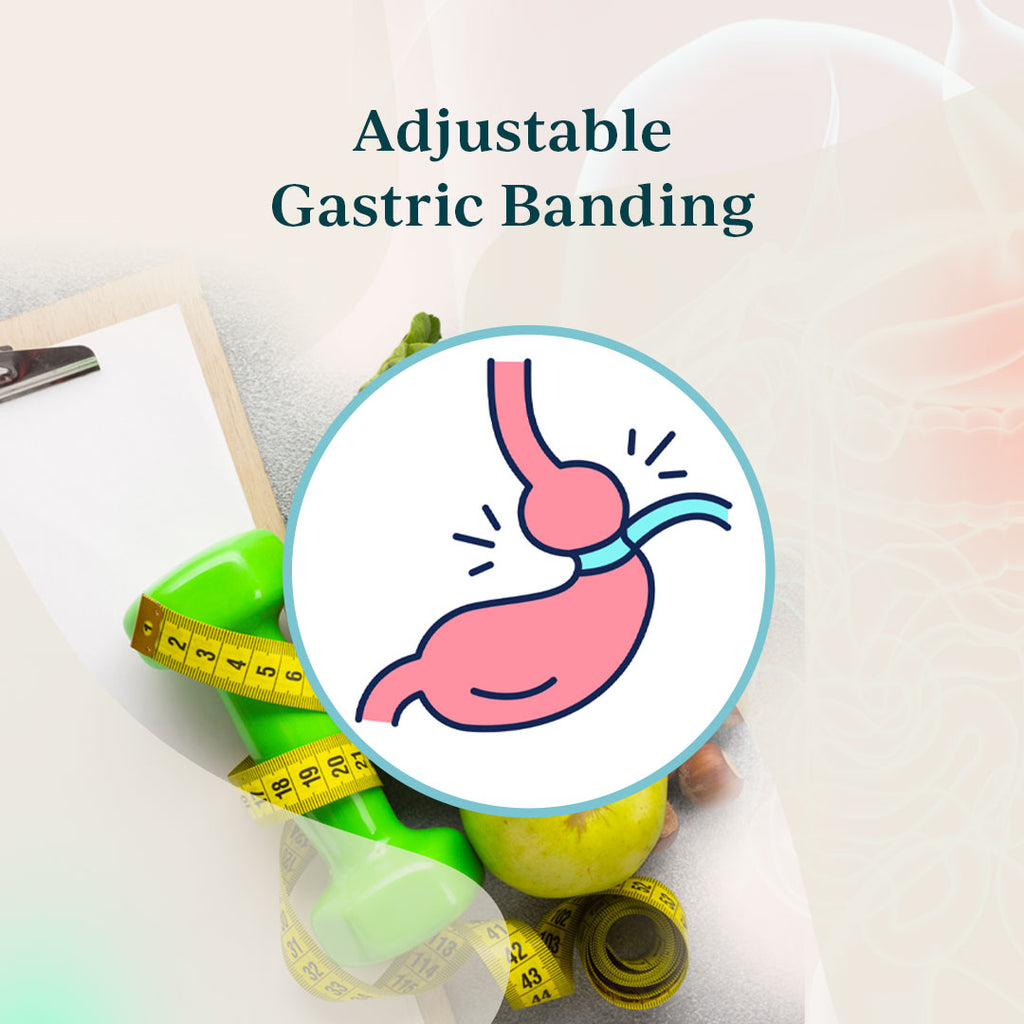
This procedure is less invasive than other bariatric procedures, and it doesn't directly interfere with nutrient absorption as much. However, it will still limit the amount of food you can consume, making supplementation essential. Your doctor will likely recommend a bariatric multivitamin post-surgery.
Formulation Matters: Liquid Vs. Chewable Vs. Capsules
Choosing the right formulation for your bariatric vitamins is as crucial as the nutrients they contain. Post-surgery, your ability to tolerate certain forms may change, making this choice critical for your comfort and the efficacy of the supplement. That said, here's an overview of the various forms:
Liquid vitamins: These supplements are ideal for immediate post-operative stages. They're easy to swallow and readily absorbed, making them perfect for individuals who struggle with swallowing pills or capsules.Chewable vitamins: These supplements offer a convenient alternative as you transition from liquids. They don't require water to consume and are easier to digest than capsules, making them relatively ideal for post-bariatric surgery patients.Capsules: These supplements are generally more affordable than liquid and chewable formulations. However, some individuals may find them challenging to swallow, and they may not be suitable in the immediate post-surgery phase due to absorption difficulties.
Avoiding Common Pitfalls in Bariatric Vitamin Selection
Navigating the world of bariatric vitamins can be tricky. Here are some common pitfalls to be aware of:
Overlooking Personalized Needs
Your nutritional requirements are unique, especially after bariatric surgery. Don't fall into the trap of adopting a one-size-fits-all approach. Consult your doctor or dietician to tailor your vitamin regimen based on your specific surgery type, dietary restrictions, and blood work results.
Relying on Over-the-Counter Vitamins
Not all vitamins are created equal. Regular vitamins aren't designed for the specific needs of bariatric surgery patients. They often lack the necessary dosages of key nutrients like iron, calcium, and vitamin B12.
Opt for pharmaceutical-grade vitamins designed specifically for bariatric patients. Bariatric vitamins have optimal amounts of key nutrients, and they are easier to absorb than over-the-counter vitamins.
Focusing Solely on Price
While cost is a consideration, you shouldn't settle for the cheapest option. Ensure you choose bariatric vitamins manufactured by reputable brands with high-quality standards. Choosing bariatric-specific vitamins can ultimately save money in the long run by preventing potential deficiencies and associated health issues.
Neglecting Regular Monitoring
Your nutritional needs will evolve as you recover after surgery. Regular blood tests are essential to monitor nutrient levels and adjust your supplementation accordingly. Neglecting this step can lead to nutritional deficiencies or excesses, both of which can be detrimental to your health.
Ignoring Formulation Compatibility
After undergoing weight loss surgery, your stomach's tolerance levels will change. Starting with liquid or chewable vitamins and gradually moving to capsules as your tolerance improves is crucial. Avoid consuming pill forms that might be harder to digest or absorb in the early stages of your recovery.
Overlooking Product Labels
When choosing bariatric vitamins, you can't afford to ignore product labels. Look for bariatric-specific vitamins with optimal dosages of key nutrients like iron, calcium, and vitamin B12, as these are essential for your post-surgery health.
Avoid vitamins with excessive fillers, artificial colors, and preservatives, as these can irritate your stomach and offer no nutritional value. Additionally, avoid chewable or gummy vitamins with high concentrations of sugar, as they can undermine your weight loss goals.
Conclusion
Choosing the right bariatric vitamins is a crucial decision in your post-surgery recovery and weight loss management. By understanding the types of vitamins available, key ingredients to look for, and common pitfalls to avoid, you'll be able to make informed choices that promote your well-being.
Remember, each person's needs are unique, so consult your physician or dietician to tailor your vitamin regimen to your specific requirements. Check out our shop for a wide collection of bariatric vitamins.
FAQs
Do I Need to Take Bariatric Vitamins for Life?
Most individuals who undergo weight loss surgery must take bariatric vitamins for the rest of their lives due to reduced food intake and potential malabsorption issues. However, your specific needs may change over time, so ongoing monitoring and adjustment of your supplementation plan are crucial.
How Soon After Bariatric Surgery Should I Start Taking Vitamins?
Most individuals start taking supplements almost immediately after surgery to address nutritional deficiencies. However, the exact timeframe may vary depending on the specific procedure and your health status. Consult your healthcare team for the ideal time when to start taking vitamins.
Can I Take Regular Vitamins After Weight Loss Surgery?
While regular vitamins might seem convenient since they're readily available, they often lack the appropriate dosages of key nutrients required post-surgery. Opt for bariatric-specific vitamins as they are formulated to meet the unique absorption needs of individuals who have undergone weight loss surgery.
What Are Some Potential Side Effects of Bariatric Vitamins?
Like any supplement, bariatric vitamins can cause side effects in some individuals. Some potential side effects include nausea, diarrhea, or constipation. If you experience these or other side effects, consult your physician for advice. They may recommend switching formulations or adjusting dosages.
How Do I Know If I Need Additional Supplements Beyond a Multivitamin
Your need for additional supplements will depend on your specific nutritional requirements, which can be determined through blood work and consultations with your physician or dietician. They can identify any deficiencies and recommend additional supplementation if necessary.


Leave a comment